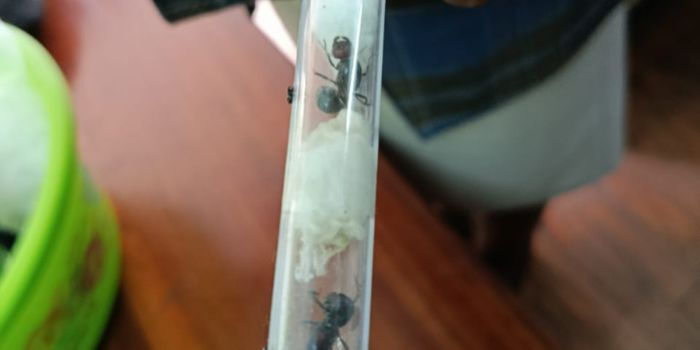On Monday, April 14, the Kenya Wildlife Service (KWS) shared shocking details of how four individuals—three of them foreigners—attempted to smuggle 5,000 live queen ants out of the country.
The ants, estimated to be worth about Ksh1 million, were hidden inside specially altered test tubes and syringes in an elaborate trafficking scheme.
According to a statement from KWS, the four suspects were arrested on April 5 and the entire operation has been condemned as a serious wildlife crime and a clear case of “biopiracy.”
Biopiracy, as KWS explained, is the illegal collection and export of a country’s genetic resources without permission or benefit-sharing, which violates both Kenya’s national laws and the Nagoya Protocol on Access and Benefit-Sharing.
KWS revealed that the suspects had ingeniously modified the test tubes to help the queen ants survive for up to two months.
These containers were carefully designed to bypass airport security checks, including X-ray machines.
To keep the ants alive during transit, cotton wool was packed inside the tubes—pointing to a calculated and professional smuggling effort. The suspects had reportedly entered Kenya using tourist visas.
Intelligence gathered by KWS showed that the group planned to sell the queen ants in exotic pet markets located in Europe and Asia.
These markets are known to offer high prices for rare insect species, with queen ants being especially popular due to their role in forming entire ant colonies.
Prices vary based on species, ranging from Ksh200 to Ksh1,000 for common queens, Ksh1,500 to Ksh5,000 for rarer ones, and up to Ksh15,000 for the most exotic or hard-to-find types.
Queen ants are highly prized among collectors for their fascinating behavior, ability to build complex colonies, and even their usefulness in controlling pests in greenhouses.
This combination of traits has fueled global demand, making queen ants a valuable commodity in the illegal trade of wildlife.
Their popularity in artificial habitats known as formicariums has made them an appealing target for traffickers, leading to their unlawful extraction from the wild.
KWS raised the alarm on this emerging threat, warning that the illegal trade is no longer just about the trafficking of iconic big animals like elephants and rhinos. Instead, lesser-known but ecologically important species, like ants, are now being targeted.
This illegal activity not only threatens Kenya’s natural heritage but also robs local communities and scientific institutions of the potential benefits these species could provide.
In response to the incident, KWS issued five urgent calls to action. First, they urged for tighter security at airports and border points, with advanced scanning equipment capable of detecting hidden wildlife.
Second, they called for public awareness campaigns aimed at educating travelers, courier services, and logistics companies about how to spot and report suspicious behavior.
Third, KWS emphasized the importance of forming research partnerships to study the global demand for rare species and the environmental impact of removing them from their natural habitats.
Fourth, they advocated for community-based education to help locals recognize the value of protecting native biodiversity.
Finally, they called for stronger border and conservation area surveillance to dismantle wildlife trafficking networks before they take root.
The four suspects were caught at a guest house in the Lake View area of Naivasha, Nakuru County, and later appeared before the Jomo Kenyatta International Airport Law Courts.
They pleaded guilty to charges related to dealing in wildlife without the necessary permits, as stated under Section 95(c) of the Wildlife Conservation and Management Act, Cap 376 of Kenyan law.
This incident has highlighted a growing and sophisticated threat to Kenya’s biodiversity, prompting authorities to step up efforts in both prevention and public awareness to stop such crimes in the future.
Join Our Political Forum official 2025 WhatsApp Channel To Stay Updated On time https://whatsapp.com/channel/0029VaWT5gSGufImU8R0DO30


